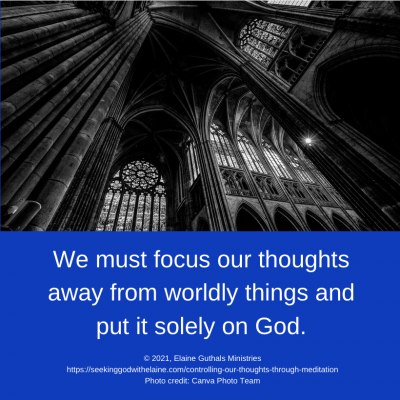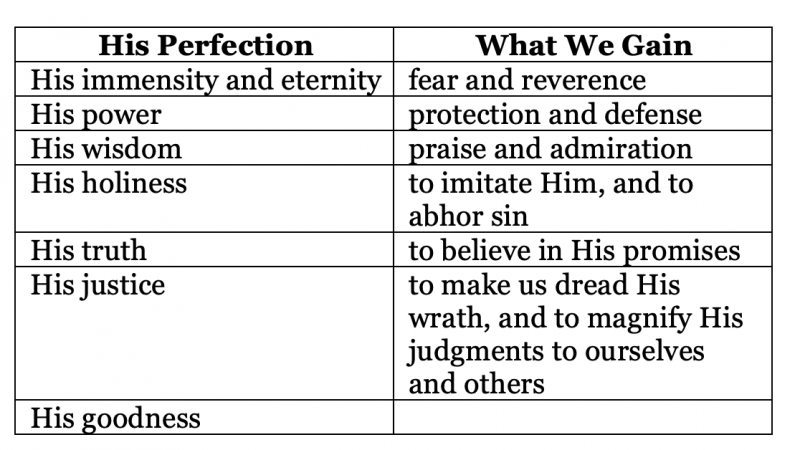In order to live godly lives, we need to control our thoughts. This daily devotional looks at how we control our thoughts by meditating on God through the sanctification process.
Nuggets
- Meditating on God helps us in the sanctification process.
- Our thoughts are a good indicator of who we are.
- Meditation puts us in the presence of the Sovereign God and our Redeeming Savior.
To read devotions in the Redo for Godliness series, click the appropriate button below.
Devotions in the How Do We Live Godly Lives? series

We are looking at Charnock’s sermon entitled The Sinfulness and Cure of Thoughts to show us how to cleanse, a.k.a. sanctify, our thought processes.
Resource
We can do that through meditation. This isn’t Eastern meditation.
This is Scriptural meditation. “I will meditate on your precepts and fix my eyes on your ways” (Ps. 119: 15 ESV).
It is thinking thoughts the right way.
Let's Put It into Context #1
Here is a running list of what we’ve discussed previously.
Let's Put It into Context #2
Phillips had a really good definition on meditation. He wrote, “Meditation is the action of the thoughts upon subjects which present themselves to the mind.”
Resource
Don’t we sometimes think that meditation is just the thinking part? It is also the action in the form of planning. It has an element of evaluation in it.
Meditating on God
“Oh how I love your law! It is my meditation all the day” (Ps. 119: 97 ESV)
“Ballast your heart with a love to God. David thought all the day of God’s law, as other men do of their lusts, because he inexpressibly loved it”
“I hate the habit of faith is attended with habitual sanctification, so the acts of faith are accompanied with a progress in the degrees of it. That faith which brings Christ to dwell in our souls will make us often think of our Inmate” (Charnock, The Sinfulness and Cure of Thoughts)
Meditating on God helps us in the sanctification process.
We are going to start this out with a kind of funky quote from Charnock. We get the first part. Meditating stabilizes our hearts and minds and calms us as we think about the love of God.
Charnock wrote that he hated that sanctification was a process. The way I read that was he would have rather it would have been a one-time gift.
We probably all have felt that way at some point or another. Instead, we get the struggle.
That struggle is caused by the fact that, even though we are new creations, our old sinful nature is still within us. Satan is still trying his best to get us to sin against God.
Glossary
Yes, that does present itself in our actions. It begins, however, in our thoughts. That is where Satan launches his attack.
That is where we must shore up our defenses.
Enter the meditating all day. If we are thinking of God all day, there is no room for Satan to get a toehold.
If we are thinking of God all day, that makes Him the Inhabitant — the Inmate — of our heart.
Meditating for Us
“For as he thinketh in his heart, so is he: Eat and drink, saith he to thee; but his heart is not with thee” (Prov. 23: 7 KJV)
“Accustom yourself to a serious meditation every morning. Fresh-airing our souls in heaven will engender in us a purer spirit and nobler thoughts. A morning seasoning would secure us for all the day. In this meditation, look both to the matter and manner. First, Look to the matter of your meditation. Let it be some truth which will assist you in reviving some languishing grace, or fortify you against some triumphing corruption; for it is our darling sin which doth most envenom our thoughts …” (Charnock, The Sinfulness and Cure of Thoughts)
Our thoughts are a good indicator of who we are.
Tuck wrote that our thoughts tell God the intent of our hearts. Words and actions can be manipulated to portray any motive we want. Our thoughts are more authentic.
Resource
Our journey on the Sanctification Road includes sanctification of our thoughts. That means that we can learn to control them.
I know. There are many times that we don’t think we can.
We can, but only with God’s help.
Have you ever considered that sin generally comes from our thoughts? Even when it has a visual or auditory component, we have to consider whether we will give into the temptation.
Maybe that is why it is so hard to corral our thoughts after we become disciples! Satan doesn’t want to give up that inroad to getting us to deny God.
We have some control. It isn’t a free-for-all in our minds. And Satan does slap evil thoughts into our minds.
Tuck wrote “Thinking is the combining, comparing, and rearranging of the actual contents of the mind.”
Resource
One phrase that caught my attention was when Tuck said the power of renewed will.
- Yes, it is a habit.
- Yes, it is a redo.
- The power is from God through the Holy Spirit, Who lives within us.
Tuck identified what it feels like to not regulate our thoughts: helplessness.
Think about when we get our thoughts corralled. We can’t say it is us mastering ourselves. It is all God. “Search me, O God, and know my heart! Try me and know my thoughts!” (Ps. 139: 23 ESV).
But it is about knowing ourselves. Walter wrote, “The thoughts of men’s hearts do evidence what their spiritual state is.”
Resource
But then it seems Walters contradicts himself. He said that our heartbroken thoughts doesn’t tell us the state of our souls.
Hmmm. Isn’t that when we tell ourselves that we are at rock bottom all the way around? Isn’t that when we tell ourselves we are worthless?
That is when, though, our thinker is impaired. We’re not combining, comparing, and rearranging in the undamaged order.
We’ve been looking at character all year. Mitchell told us that our character finds its home in our heart. Clifford called our thoughts the index of character. Cuyler stated that “The character of a man’s thoughts determines the character of his life.”
Resource
We express ourselves through our actions. Our thoughts show our purpose.
If we think of the Sanctification Road as a progress — really — life is, too. Clifford contends that sanctification utilizes our thoughts to accomplish regeneration. Regeneration is being changed from spiritually dead to spiritually alive and the internal requickening in us that God brings about through the work of the Holy Spirit to give us new character. Spiritual death is the separation from God that occurred as a consequence of Adam and Eve’s original sin. The spiritually alive are those who have ABCDed, so they are no longer separated from God.
The ABCDs of Salvation
If you have not become a believer in Christ, please read through the
Plan of Salvation and prayerfully consider what God is asking you to do.
A – admit our sins
B – believe His Son Jesus is our Redeemer
C – confess God as Sovereign Lord
D – demonstrate that commitment by making any changes needed in our lives to
live the way in which God has called us
The Disciple’s Job Description
I almost didn’t put that. To me, the progression is salvation, regeneration, sanctification, perfection.
I can see what Clifford is saying if we look at regeneration as one of the past, present, and future words. I was regenerated at the moment of salvation. I am in the process of being regenerated through salvation. Once eternity begins, I will fully be regenerated.
“May my meditation be pleasing to him, for I rejoice in the LORD” (Ps. 104: 34 ESV)
Secondly, Look to the manner of it. First the glances of the eye, soon on and soon off; they make no clear discovery, and consequently raise no sprightly affections. Secondly, Let it be affectionate and practical. Meditation should excite a spiritual delight in God, as it did in the Psalmist: ‘My meditation of Him shall be sweet: I will be glad in the Lord’ (Psalm 104:34); and a Divine delight would keep up good thoughts, and keep out impertinencies” (Charnock, The Sinfulness and Cure of Thoughts)
Meditation puts us in the presence of the Sovereign God and our Redeeming Savior.
Horton gave us a really good history on the Hebrew meaning of meditation. It has three aspects to it.
The first is the aspect of meditation. We examine our thoughts, which, as Horton wrote, “… are of great importance to us, and that as they are a very great discovery of the frame and temper of our hearts.” Thoughts that stick show who we really are.
Resource
The second is the aspect of prayer. Horton talked about conversing and communing with God. By doing this, we find contentment.
Spurgeon reminded us that meditation is not lazy. When we think on God, we lay the best possible foundation we could have.
Spurgeon also reminded us that it is our meditation. “May my meditation be pleasing to him, for I rejoice in the LORD” (Ps. 104: 34 ESV emphasis added). This is our connection with God.
Resource
The third is the aspect of discourse. Horton said this was the communion of the saints. He wrote, “Christians find a great deal of contentment in holy and religious communication; not only when they think upon Him within themselves, which is meditation, not only when they speak unto Him, which is done in prayer, but also when they speak of Him, and about Him in converse, and Christian discourse.”
Resource
I know. That takes the scenic route to the period. What Horton is saying is our meditation and conversations with God spill over into our conversations with others.
The Weekly Pulpit had an interesting description of meditation. They said that “it is not the pressing act of mind, as when pursuing knowledge, or seeking to unravel some mystery, but the mind, in its own seclusion, dwelling calmly and seriously on matters affecting life and death.”
Resource
I like Garbett’s description of calling meditation attentive thought. We must focus our thoughts away from worldly things and put it solely on God.
Resource
Think about how this clears our thoughts. We go from the chaotic, divisive thoughts of this world to God’s pure and holy thoughts.
We talked in Where Is the Balance? about the work of God. His working in us is the only way we are going to know Him.

To read a related devotion, click the button below.
Part of that is remembering. Reflecting back on something that has happened can impact us more now than it did at the time.
That may be because we are out of the heat of the moment. We can evaluate it better. Maybe we can hook it to other experiences that we can’t pull up in the chaos of the event.
This introspection does help us slow down and think about what is important. It gives us time to consider what God wants us to be and do and allows us to plan to do that.
Meditation leads to what Bogg called moral excellence. He defined it as “… that which renders them at all attractive, and to the reflecting, and cultivated mind, is the direct object of esteem and love.”
Resource
Oh, wait. That reflecting and cultivated mind kind of slipped in there on me. I wasn’t expecting that.
But doesn’t that fit? It is apt. It combines the thinking and the work that it takes to think and plan.
To me, our moral excellence is what we are striving for. It is doing what is right and not doing what is wrong God’s way.

Making the Connections
We control our actions. We can control our thoughts and feelings through meditating on God. Horton wrote, “God’s servants are much employed and taken up in the thought of God, in holy and Divine meditation.”
Resource
I liked what Bogg said. He wrote, “IN ALL THESE CHARACTERS OUR MEDITATION OF HIM SHOULD DELIGHT THE SOUL; because all that is great, and excellent, and glorious, and good, and attractive, passes before our minds in contemplating the character, the works, the ways, and the purposes of God; objects, the contemplation of which, not only gives scope for the exercise of its noblest powers, but excites all the most pleasing affections of the soul; reverence, esteem, love, gratitude, faith and hope.”
Resource
How Do We Apply This?
Horton said that when we are engaged in prayer, reading and hearing the Word, and other godly activities, they promote holy thoughts and meditations.
Resource
Hannam gave us a little more direction on how to apply our meditation. He said we should meditate on God’s perfections and told us what we gain.

What I get from all of this is we need set times to do the thinking. Oh, yeah. We all can have our moments when we turn on the reflections. But this is talking about a defined, intentional process to tie into God’s plan for our lives.
We shouldn’t leave our meditation to chance. But so often, we do (four fingers pointing back at me, here).
Shedd reminded us that our happiness depends on the quality of our thoughts. When God is the focus of our thoughts, our happiness is secured.
Resource
Father God. We want to meditate on You all day long. Help us to think on You in our hearts and in our minds so that we may please You. Amen.
What do you think?
Leave me a comment below (about this or anything else) or head over to my Facebook group for some interactive discussion.
If you don’t understand something and would like further clarification, please contact me.
If you have not signed up for the email daily or weekly providing the link to the devotions and the newsletter, do so below.
If God has used this devotion to speak with you, consider sharing it on social media.